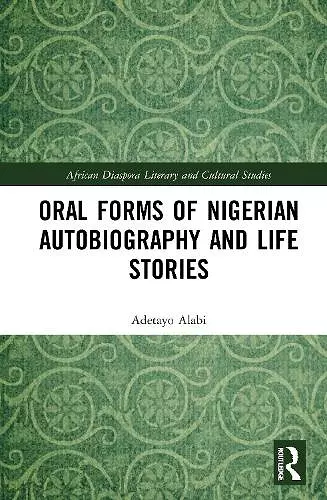Oral Forms of Nigerian Autobiography and Life Stories
Format:Hardback
Publisher:Taylor & Francis Ltd
Published:20th Aug '21
Currently unavailable, and unfortunately no date known when it will be back
This hardback is available in another edition too:
- Paperback£41.99(9780367745059)

Oral Forms of Nigerian Autobiography and Life Storiesdiscusses the oral life stories and poems that Africans, particularly the Yoruba people, have told about the self and community over hundreds of years.
Disproving the Eurocentric argument that Africans didn’t produce stories about themselves, the author showcases a vibrant literary tradition of oral autobiographies in Africa and the diaspora. The oral auto/biographies studied in this book show that stories and poems about individuals and their communities have always existed in various African societies and they were used to record, teach, and document history, culture, tradition, identity, and resistance. Genres covered in the book include the panegyric, witches’ and wizards’ narratives, the epithalamium tradition, the hunter’s chant, and Udje of the Urhobo.
Providing an important showcase for oral narrative traditions this book will be of interest to students, scholars, and researchers in African and Africana studies, literature and auto/biographical studies.
Oral Forms of Nigerian Autobiography and Life Stories is a brave and noble effort to identify and affirm the presence and role of an oral and aural way of being and knowing comprising a rich and nuanced ethical epistemology among the Yoruba and Urhobo people of Nigeria. Professor Adetayo Alabi’s heroic struggle against the unwarranted domination of one epistemology over another – intellectual and spiritual colonization – is inspiring in itself.
Rowland Abiodun, John C. Newton Professor of Art History and Black Studies, Amherst College, MA, USA.
Oral Forms of Nigerian Autobiography and Life Stories
foregrounds the oral creative process in Nigerian texts about the self and the community. This innovative approach extends and challenges autobiographical genres and theories by situating orality as critical to their definitions and formations. Alabi here simultaneously advances and extends our knowledge of orality, autobiography and African literature in a work that also contributes to the larger current academic decolonization processes, important in literature as in the larger intellectual schema.
Carole Boyce Davies, Frank H.T. Rhodes Professor of Humane Letters and Professor of Africana Studies and Literatures in English, Cornell University, USA.
Through a rigorous and detailed analysis of various forms, including chants, oríkì, ijala, Ẹkún Ìyàwó, and witches’ confessions, the book demonstrates how Africans like Yoruba and Urhobo peoples codified their lives and histories and represented sociocultural issues in literary and poetic forms. In particular, the book speaks to the element of resistance that these literary and performative forms embodied and afforded the subject. [...] Ultimately, the analysis suggests that rather than merely respond to Eurocentric claims about African lives, histories, and subjects, African scholars should engage with documented stories as evident in their auto/biographical genres, to see what they can tell readers and the public about African peoples, their ways of being, their own documentations and definitions of themselves, and the ways they continue to define themselves on digital platforms.
Mosunmola Adeojo, University of Florida, USA.
ISBN: 9780367721664
Dimensions: unknown
Weight: 453g
240 pages